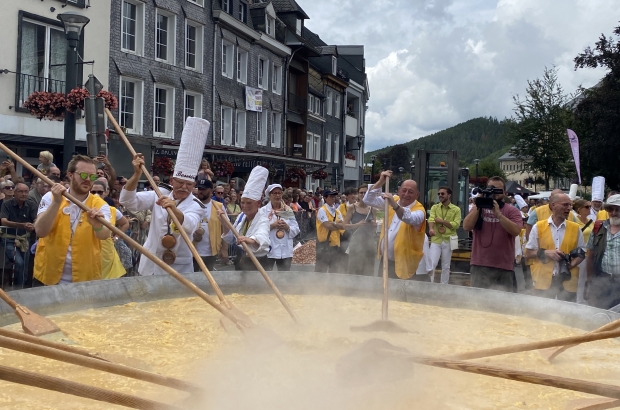- Daily & Weekly newsletters
- Buy & download The Bulletin
- Comment on our articles
Malmedy makes 28th giant omelette in style
The Belgian town of Malmedy, in the Eastern Cantons, is not only famous for its Cwarme – a traditional Walloon carnival - but for making a vast omelette each year.
On Tuesday, Assumption Day, it celebrated its 28th "giant omelette day" on the town’s central square, Place de Rome, watched by some 6,000 spectators who came specially to watch the event and taste the result.
This year’s omelette was made from at least 11,000 eggs as well as 50 kilos of bacon, 500g of spices, five kilos of chives and 50 litres of oil.
Traditionally, the day begins with a holy mass in which the eggs and bread are blessed. After that, representatives of the six World Brotherhoods of the Giant Omelettes parade through the town in a procession before they – clothed in white – arm themselves with a cooking spoon two metres long and approach the pan.
Everything is indeed giant-sized, said Bénédicte Mathy, grand master of the World Brotherhood of the Giant Omelette of Malmedy explained before this year’s event.
“We have at least 10,000 eggs and a frying pan four metres in diameter," she said.
Cooking the enormous egg speciality is no mean feat either. “First we will break the eggs, prepare the plates and cut the bread," she added.
"Then the pan is put on the open fire which has been heating up for some time and we simply pour the eggs into the pan.”
Once cooking starts, stirring begins, “a relatively physical process,” Mathy added, especially in warm weather.
At 12.30 the first servings of the immense feast were distributed to the crowds – this free tasting taking place to music. Festivities and games then continued throughout the day, that culminated in a raffle, barbecue and ball.
Malmedy is not the only place to enjoy this gigantic egg extravaganza. Several other fraternities celebrate omelette days: Bessières and Fréjus in France; Granby, Quebec and Dumbéa, New Caledonia, Canada; Abbeville in Louisiana, United States and Pigué in Argentina.
Photo: Françoise Pfeiffer/Belga



















